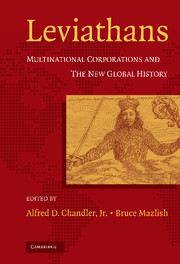Book contents
- Frontmatter
- Contents
- List of Figures and Tables
- Acknowledgments
- List of Contributors
- Introduction
- PART ONE THE SCOPE OF THE MULTINATIONAL PHENOMENON
- PART TWO CULTURAL AND SOCIAL IMPLICATIONS OF MULTINATIONALS
- PART THREE THE GOVERNANCE OF MULTINATIONALS
- 7 Governing the Multinational Enterprise: The Emergence of the Global Shareowner
- 8 The Financial Revolutions of the Twentieth Century
- 9 Multinational Corporations, the Protest Movement, and the Future of Global Governance
- Conclusion
- Index
9 - Multinational Corporations, the Protest Movement, and the Future of Global Governance
Published online by Cambridge University Press: 17 August 2009
- Frontmatter
- Contents
- List of Figures and Tables
- Acknowledgments
- List of Contributors
- Introduction
- PART ONE THE SCOPE OF THE MULTINATIONAL PHENOMENON
- PART TWO CULTURAL AND SOCIAL IMPLICATIONS OF MULTINATIONALS
- PART THREE THE GOVERNANCE OF MULTINATIONALS
- 7 Governing the Multinational Enterprise: The Emergence of the Global Shareowner
- 8 The Financial Revolutions of the Twentieth Century
- 9 Multinational Corporations, the Protest Movement, and the Future of Global Governance
- Conclusion
- Index
Summary
Globalization is difficult to define precisely. It certainly transcends economic relations, including social, cultural, and political processes that are enmeshed in a larger “global” order – forms of social, political, and economic organization beyond the pale of the state. Globalization is a transition from a world ordered geographically, in which the basis for economic and political organization was sovereign territoriality, to an aterritorial, networked mode of organization whose present and evolving form is not yet clear. Control over space, national markets, and nation-states is no longer sufficient to ensure control over economic and political activities. The new forms of governance just beginning to emerge lack legitimacy and are poorly understood. Old and familiar modes of governance are becoming problematic, and new institutions more suited to a global age are just beginning to evolve.
THE ISSUES AND PREMISES OF THE ANTIGLOBALIZATION MOVEMENT
Much of the opposition to globalization today is itself a function of globalization led by individuals and groups from disparate geographic locations tied together through electronic networks and common objectives. A sign held by antiglobalization protesters at Davos in 2001 read “Our resistance is as global as your oppression.” The emergence of an aterritorial, networked global system is at the root of the problem of legitimacy and power of international institutions and inexorably links both multinational corporations (MNCs) and the anticorporate movement in interwoven, global electronic webs.
The relative importance of MNCs in the world economy has increased dramatically since the 1970s.
- Type
- Chapter
- Information
- LeviathansMultinational Corporations and the New Global History, pp. 219 - 236Publisher: Cambridge University PressPrint publication year: 2005
- 6
- Cited by



